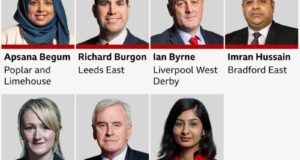 Pressure is growing on cabinet ministers and senior figures from all parties to publish their tax
Pressure is growing on cabinet ministers and senior figures from all parties to publish their tax
returns.
George Osborne is the latest politician to say he is considering following David Cameron’s lead in
releasing details of his income and all tax paid.
Labour’s Jeremy Corbyn and Lib Dem Tim Farron are both expected to do so but Nigel Farage says he
won’t follow suit.
The PM will tell MPs later he wants to see criminal penalties for firms whose staff enable tax
evasion.
David Cameron’s data on his 2009-15 tax and earnings was released on Sunday in an attempt to
defuse a row about his investment in his late father’s offshore fund, details of which emerged in a
leak of documents from Panamanian firm Mossack Fonseca.
The summary of tax returns released by Mr Cameron show he received two payments totalling
£200,000 from his mother Mary in 2011, a year after he inherited £300,000 from his father.
Downing Street has said it is up to individual ministers to decide whether they wish to publish
personal tax information.
The BBC’s assistant political editor Norman Smith said although no final decision had been made it
was understood that Mr Osborne was “quite likely” to release his returns in the next couple of days.
The chancellor’s aides have stressed Mr Osborne has never held any offshore funds – and that his
sources of income are “straightforward” – his salary, rental income and shares in his father’s firm.
New offence
Mr Cameron had already been pushing for greater tax transparency and is due to hold a summit on
beating corruption of all kinds in London next month.
Ahead of a statement to the House of Commons, he said: “This government has done more than any
other to take action against corruption in all its forms, but we will go further.
“That is why we will legislate this year to hold companies who fail to stop their employees facilitating
tax evasion criminally liable.”
David Cameron will tell MPs he will get tough on companies which are soft on tax evasion.
This is part of his battle to regain voters’ trust after a torrid week of headlines.
He will repeat he is now being more transparent than any previous prime minister. But he may be
inflicting some collateral damage on colleagues amid growing calls for senior politicians to reveal
their tax affairs.
The chancellor has not committed to publishing his returns, but aides are making it clear he has not
held shares in overseas trusts.
The Labour leader faces a challenge to convince voters his party can be trusted to do things
differently, and his MPs that he can strike a blow against the PM.
Not for the first time UKIP leader Nigel Farage is bucking a trend, telling the BBC it was “a big no” to
releasing information on how he is taxed.
Plans for a new offence for firms that fail to act to prevent economic crime were announced in
February last year by the then-chief secretary to the Treasury, Danny Alexander.
They were put out to consultation and Mr Cameron is expected to announce that they will be
included in May’s Queen’s Speech, with a new offence then expected to become law later this year.
It would lower the threshold of responsibility for companies whose employees may have advised
clients to take actions which would evade – as opposed to avoid – paying tax.
This proposed legislation is an extension of the Bribery Act, which made firms responsible if they
failed to take enough measures to prevent their own staff or contractors paying inducements.
The government has also announced it is to set up a new task force led by HM Revenue and Customs
and the National Crime Agency to investigate allegations of tax-dodging and money laundering.
‘Public mood’
Mr Cameron took the unprecedented step of releasing a summary of earnings and tax going back six
years after being accused by Labour of misleading the public over money he had invested in his
father Ian Cameron’s company, Blairmore Holdings.
But Labour leader Jeremy Corbyn said Mr Cameron needed to publish his full tax returns dating back
to before he became prime minister in 2010, when he sold off shares in Blairmore for a £19,000
profit.
Asked about the £200,000 gift Mr Cameron received from his mother, the Labour leader said there
was “possibly” a case for looking at inheritance tax rules.
Personal finance experts say it is not unusual for wealthy families to use this kind of “tax planning” to
legally avoid inheritance tax.
Downing Street said the payments had been an attempt to “balance” the sums received by all the
Cameron children, as the prime minister’s older brother had inherited the family home.
Labour has announced a 10 point plan to “clean out” tax havens – including forcing MPs to disclose
any offshore holdings in the register of members’ interests. It has also called for a full public inquiry
into the Panama Papers.
Shadow chancellor John McDonnell has published his tax returns and Labour leader Jeremy Corbyn
is expected to follow suit.
‘Private matter’
Scotland’s First Minister Nicola Sturgeon, meanwhile, has followed other Scottish party leaders by
publishing her tax return for 2014-15, and committed to publishing it annually for as long as she is
first minister.
Conservative MP Jacob Rees-Mogg said he expected all MPs to be publishing their tax returns within
two years, reflecting changes in the “public mood” over tax transparency and the need, as he put it,
for “Caesar’s wife to be above suspicion”.
He told Radio 4’s Today that it was a “pity” that the concept of privacy was being eroded but he
believed it was “politicians fault” because they had lost the trust of the people over the expenses
affair.
The BBC’s Norman Smith said the “tax bandwagon was picking up steam” but support for full
disclosure was not universal.
UKIP leader Nigel Farage said most people regarded tax as a private matter.
“Neighbours would hate the thought that the people at Number 32 knew what their income was,”
he told BBC Radio 4’s Westminster Hour.
“I’m worried where we are going with this. If we want to have party leaders publish their tax returns
then presumably all MPs must do so, presumably then all councillors must do so, bishops of course
must do so, generals must do so, newspapers… BBC presenters must do so.”
 Weekly Bangla Mirror | Bangla Mirror, Bangladeshi news in UK, bangla mirror news
Weekly Bangla Mirror | Bangla Mirror, Bangladeshi news in UK, bangla mirror news







